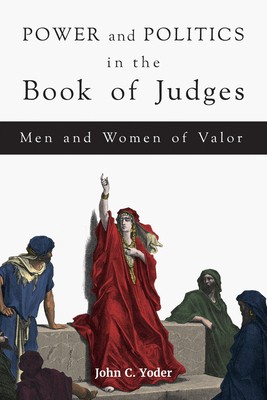
- We will send in 10–14 business days.
- Publisher: Fortress Press
- Year: 2015
- Pages: 288
- ISBN-10: 1451496427
- ISBN-13: 9781451496420
- Format: 15 x 22.6 x 2 cm, softcover
- Language: English
- SAVE -10% with code: EXTRA
Power and Politics in the Book of Judges (e-book) (used book) | bookbook.eu
Reviews
Description
Power and Politics in the Book of Judges studies political culture and behavior in premonarchic Israel, focusing on the protagonists in the book of Judges. Although the sixth-century BCE Deuteronomistic editor portrayed them as moral champions and called them judges, the original bardic storytellers and the men and women of valor themselves were preoccupied with the problem of gaining and maintaining political power. These mighty ones were ambitious, at times ruthless; they might be labeled chiefs, strongmen, or even warlords in todays world.
John C. Yoder considers the variety of strategies the men and women of valor used to gain and consolidate their power, including the use of violence, the redistribution of patronage, and the control of the labor and reproductive capacity of subordinates. They relied heavily, however, on other strategies that did not deplete their wealth or require the constant exercise of force: mobilizing and dispensing indigenous knowledge, cultivating a reputation for reliability and honor, and positioning themselves as skillful mediators between the realms of earth and heaven, using their association with YHWH to advance their political, economic, or military agenda.
EXTRA 10 % discount with code: EXTRA
The promotion ends in 20d.17:42:42
The discount code is valid when purchasing from 10 €. Discounts do not stack.
- Publisher: Fortress Press
- Year: 2015
- Pages: 288
- ISBN-10: 1451496427
- ISBN-13: 9781451496420
- Format: 15 x 22.6 x 2 cm, softcover
- Language: English English
Power and Politics in the Book of Judges studies political culture and behavior in premonarchic Israel, focusing on the protagonists in the book of Judges. Although the sixth-century BCE Deuteronomistic editor portrayed them as moral champions and called them judges, the original bardic storytellers and the men and women of valor themselves were preoccupied with the problem of gaining and maintaining political power. These mighty ones were ambitious, at times ruthless; they might be labeled chiefs, strongmen, or even warlords in todays world.
John C. Yoder considers the variety of strategies the men and women of valor used to gain and consolidate their power, including the use of violence, the redistribution of patronage, and the control of the labor and reproductive capacity of subordinates. They relied heavily, however, on other strategies that did not deplete their wealth or require the constant exercise of force: mobilizing and dispensing indigenous knowledge, cultivating a reputation for reliability and honor, and positioning themselves as skillful mediators between the realms of earth and heaven, using their association with YHWH to advance their political, economic, or military agenda.


Reviews